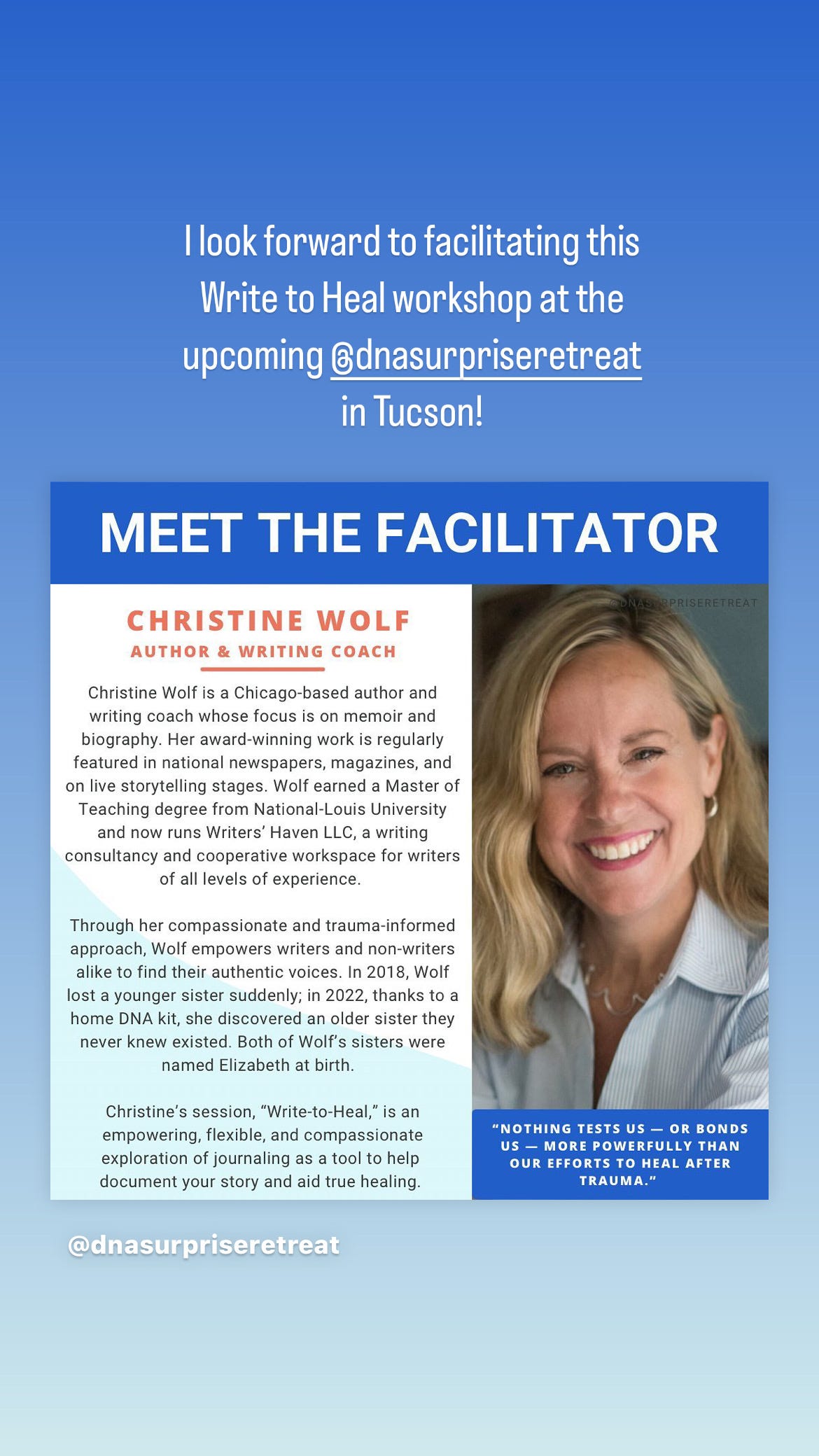In March of 2022, I discovered through 23andme that I have an older half-sister I never knew existed. I was 53 years old when I made this discovery, and the news came out of the blue for both of us. We’ve spent the past year building and tending to our brand-new sisterhood, and it’s been an eye-opening, loving, and fascinating journey.
When I first learned the news, I didn’t know where to turn, let alone how to describe my circumstances. I was desperate to understand what was happening, and started frantically Googling words that described my circumstances, like “sudden family,” “unexpected family,” “sister I didn’t know I had,” “genetic discovery,” “sudden half-sibling,” “unexpected half-sibling.” It was only when I put the letters “DNA” into a podcast search engine that a door finally opened.
When I landed on the DNA Surprises Podcast, hosted by Alexis Hourselt, I began to fully appreciate this new world we’d stepped into — and how multi-layered and complicated it actually is. I found a community that “gets it”, and I began to breathe a bit easier knowing we were hardly alone.
Alexis had her DNA surprise in 2021 when she learned the man she’d called “Dad” for 35 years was not her biological father. She also learned that she is not a Mexican woman, as she was raised, but African American. She swiftly turned her pain into helping others with her podcast, DNA Surprises, and retreat, DNA Surprise Retreat.

I’ve spent the last year learning new terms like NPE (non-paternity event or not parent expected), MPE (misattributed parentage experience), and many more. And though my circumstances don’t fit into ANY of those categories, as the brand new sibling of someone whose circumstances do, I’ve been absorbing everything I can about the dynamics of DNA surprises: watching YouTube videos and webinars; following podcasts; reading books and articles and columns and personal essays; and speaking to others about their DNA experiences.
While my half-sister’s experience is hers to tell (or not), I’ll briefly explain how our DNA surprise has impacted me.
Oftentimes, NPEs and MPEs learn that their biological parent — typically their biological father — is someone other than who they believed or understood them to be. The discovery is stunning on multiple levels and has ripple effects that often leave NPEs and MPEs reeling with emotions and feelings that include shock, anger, confusion, betrayal, grief, and many more.
I am neither an NPE nor an MPE. My DNA surprise didn’t reveal a change or misattribution of my parentage. My DNA discovery was that my biological father had had a relationship with someone other than my mother before I was born, and that a child was conceived from that union, a child who is my (newly-discovered) half-sister.
Our biological father’s identity came as a massive surprise to my half-sister. Genetically speaking, my father is exactly who I always believed him to be. However, morally and behaviorally speaking, I’ve learned that he made choices long ago that were, for lack of a better term, completely “on brand” for a man from whom I’d been estranged for the last 20 years of his life.
Once I discovered the DNA Surprises Podcast, I devoured the episodes, hoping to hear the perspectives of others who identified with situations like mine — and I did. The podcast offers these excellent resources, and Alexis Hourselt shares an approach that’s compassionate, informative, and validating for NPEs AND their families. Here’s a compelling interview with Alexis about her own journey.
Since I’m a writing coach who offers a therapeutic approach to processing difficult memories AND I have an NPE sibling, I reached out to Alexis and offered to lead a workshop in expressive writing during her upcoming DNA Surprise Retreat. She and her cohost welcomed me to their team of facilitators, and I’m thrilled to announce I’ll lead a customized Write To Heal Workshop to support attendees as they continue processing their DNA discoveries.
Whether you’ve been touched by a DNA suprise or not, I hope you enjoy the podcast Alexis recorded of our recent conversation about expressive writing. It offers insight not only about the practice itself, but also about how it supports writers and non-writers alike to process painful memories, long-held secrets, and past experiences of overwhelm and upheaval. Take a listen and learn how to incorporate expressive writing into your own life. When you’re done, I’d love to know your thoughts about it!













Share this post